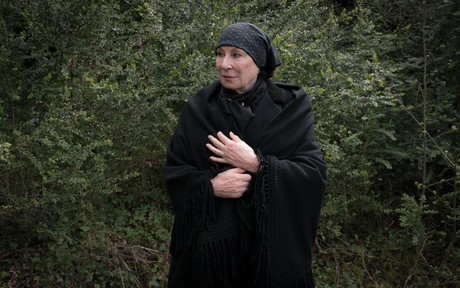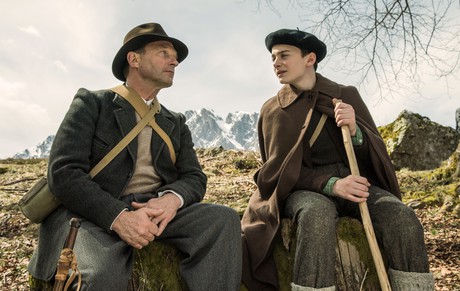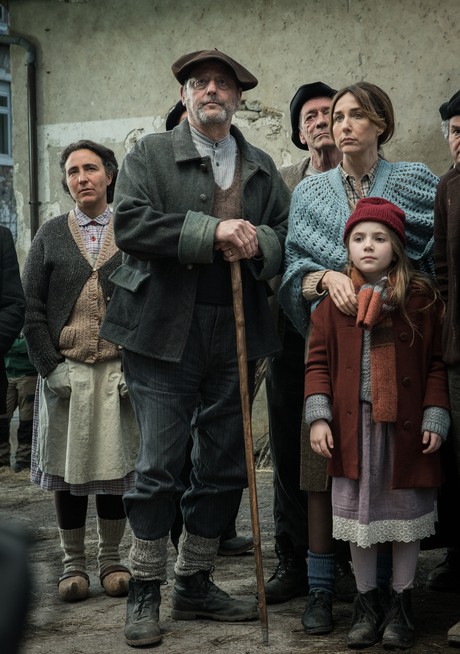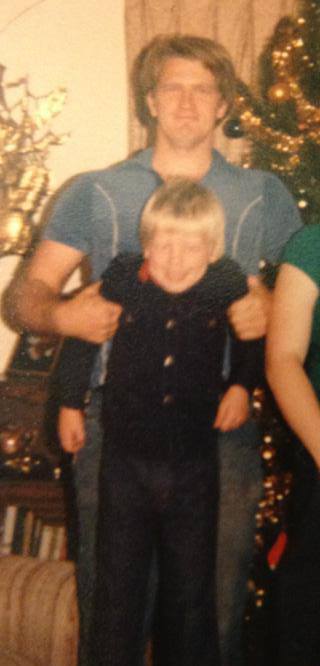Hello, all! McEric here with coverage for a new film about World War II released today in select theaters, On Demand, and streaming, called WAITING FOR ANYA, based on the acclaimed novel by Michael Morpurgo (WAR HORSE), written/directed by Ben Cookson (ALMOST MARRIED), and starring Noah Schnapp ("Stranger Things"), Jean Reno (LEON), Angelica Huston (WITCHES), Frederick Schmidt (MISSION:IMPOSSIBLE - FALLOUT), and Thomas Kretschmann (AVENGERS: AGE OF ULTRON).
Check out the trailer:
There has been no shortage of films made about World War II, with varying degrees of cinematic worth. While not every film can be SCHINDLER'S LIST, the strength of WAITING FOR ANYA is in its illuminating portrayal of a forgotten corner of the war: the German occupation of France.
The film opens in 1943 on Jo (Shnapp), a young illiterate shepherd tending to his family's flock of sheep in the shadow of the Pyrenees mountains, dozing off on a peaceful sunny day. He is awoken by his dog warning of a bear nearby, and he rushes back to his village to alert the men there. They grab their guns and head off to deal with the bear, making short work of the great beast and dragging its carcass back to town where all celebrate. It's a metaphor of what is to come.
When Jo goes back to learn what fate befell his dog, he comes across a strange man, Benjamin (Schmidt) in the woods, who is holding a bear cub. He explains that he saw the whole exchange, and that the bear was simply protecting its cub from the boy and dog. He says he will take the cub with him and raise it until it is strong enough to survive on its own. Jo is fascinated by Benjamin and the kindness being shown to the cub that he clumsily orphaned, so he follows him back to his farm, looking to bring some milk to the cub. What he finds instead is a young Jewish girl.
From there the story widens to reveal Resistance fighters among the townspeople helping to ferry Jewish refugees across the mountain ridge into Spain to find freedom from oppression and persecution. Jo becomes an ally, which is a relatively harmless choice until the Nazi occupation makes its way to his village's front door.
Part coming-of-age story, part perils of war, and overflowing with heart, WAITING FOR ANYA is a quiet meditation on the good and evil that men can do. Showing how war can wound indiscriminately, the film benefits from amazing performances of complex characters by Schmidt, Kretschmann, and Huston.

I had the opportunity to chat with writer/director Ben Cookson about the film, his adoration of the source material, and his experiences working with an excellent cast.
Eric McClanahan – Good morning, Ben.
Ben Cookson – Hi, Eric, how’re you doing?
EM – I’m well, thank you. Are you in California or England?
BC – I’m in London at the moment.
EM – Okay, so it’s… well ahead, if I have my times correct, you’re…
BC – Yeah, it’s nearly 6 o’clock on a Friday afternoon.
EM – Okay. It’s just before noon here so I’m kind of still getting started. [Ben laughs] So I want to talk about WAITING FOR ANYA. I got to view the film and really enjoyed it. Obviously, we as humans in this modern age are still so fascinated by World War II. It was such a tumultuous time, so eye-opening in terms of human nature and good vs evil and the complexities of the human condition that I know so many films have been made from it, so many books have been written about it. So tell me how, or I guess why, you came to the adaptation of Michael Morpurgo’s novel to make this film.
BC – For me, basically, I’ve lived in France. I lived there for maybe five years; four years in Paris and one in Nice, and the experience of living in a country that was occupied, it’s very different than the UK. There are pictures in Paris of the Nazis among them; we didn’t have that in London, it’s a completely different national collective memory. Anyone who’s lived through the war, they all have stories there. In the UK you were either evacuated or sent off to fight in some far-off land, but those in France had it brought to their homes. It’s a fascinating part of history and it brings out the true character of some people, so it’s always going to be mined for these rich moments that shed light on the human condition. And particularly this one, because WAITING FOR ANYA is set in this forgotten pocket of France, down in the valley beneath the Pyrenees and it’s a story that, when I read it, felt sort of like war through a child’s eyes, and it’s this coming-of-age story. It just drew me in, basically.
EM – Right. I did think it was amazing, in the opening, where it talked about the difference between Northern and Southern France and how in the South they didn’t feel the occupation immediately and lived relatively blissfully until it did arrive on their doorstep and it’s a fascinating conundrum.
BC – Yeah, I’m glad you said that. We really wanted to get that juxtaposition of what life was like, when the country was divided in two. When they had the zone libre in the South and the occupied zone in the North, yeah, the country couldn’t have been more different. We wanted to really get people’s attention that this horror was in the post for the people of the south.
EM – I really enjoyed how the film blurred the lines between protagonist and antagonist, as when the Germans first arrived, there was obviously trepidation, though soon they settled in and became part of the town; but as the war progressed, that perception changed. At one point he [Jo] actually says in the VO that the villagers would “see them only by their uniforms”. How difficult was it balancing that tone of “friendly visitor” vs “occupational force”?
BC – Well it comes from the book and the historical accuracy. We worked with a French production designer and a French costume designer who both, during prep, spent time in the villages interviewing elderly shepherds into their nineties who’d lived through the occupation, and what they said was that the soldiers who were sent to patrol the border, they weren’t like front-line fighting troops or SS Nazi troops; they were Nazi soldiers, yes, but many of them had seen action in the first World War and they were essentially Austrian border forces and Alpine border guys who were sent there due to their mountaineering experience and skills, but they were war-weary. In the book, the corporal is this man who is a million miles from home, or at least he should be, away from his family and his daughters that he loves very much, and he questions everything. Again, he was a character who saw action in the first World War and he becomes a pacifist who wants peace. So yeah, there are these characters whose roles are complex. Jo’s father, when he returns, he’s this frightening, aggressive, drunken, violent man in the home because he’s a victim of war; he’s been interned in the labor camp. So, yeah, a lot of that is down to Michael’s skill as a novelist and his interest in showing the human condition and showing that war isn’t so black-and-white; it claims victims on all sides.

EM – I definitely picked up on that in the Corporal’s story. Thomas Kretschmann was so brilliant in the role, playing him as sympathetic, a man essentially just doing his job. I also liked the correlations drawn between his character and the bear. At the start of the film, many of the villagers view the bear as an enemy, but some are able to justify its actions based on its individual situation. And when the Corporal shares his love of honey with Jo it’s a clear metaphor drawn between he and the bear. It seems something you clearly picked up on in the book and brought to the movie. So tell me about bookending the film with the bear.
BC – Without wanting to give away too many spoilers, war is chaos and complex, and sometimes acts of kindness can lead to disaster. It also plays upon the bombing that takes place by the Allied forces on Germany to disrupt their activity there. It has a negative consequence, yes on the Nazis because that’s intentional, but also on the village as their food supplies are then running low. So in these times of chaos, you’re up against the elements, your enemies, the soldiers, but also life itself would sometimes throw you a curveball. It can have disastrous consequences.
EM – Tell me about assembling this cast. Jean Reno, Angelica Huston, Noah Schnapp. Tell me about bringing this team together and what each person brought to the production.
BC – When we approached the casting process, we intentionally wanted to make a family movie. We wanted to get the top talents, legends really, that would draw in the various demographics. Noah is a fantastic, exciting young talent with a hug fan base that we hoped would draw in an audience that may not be particularly familiar with World War II and things that took place in Europe at that time. At the same time with Angelica and Jean being legends since I was a kid, they would bring in the parents and grandparents; they’re loved in cinema. That was one approach: we wanted to try to make a film that a family would want to see, together. It’s not a children’s movie. The book is aimed at young adults and the film is accessible to young adults but by the same token it does not shy away from some of the more complex and adult issues that World War II inevitably brings. But also from my perspective, because we’re doing an English-language film set in France, it was important for me to populate the cast with French and German characters wherever appropriate, which is why Jean is playing Compere, why Thomas Kretschmann is playing the Corporal; we have Elsa Zylberstein, and Angelica is a huge Francophile who speaks French. For Noah, the project resonated with him because he’s Jewish and his family have a huge connection to this story. With the source material so prestigious, being a Michael Morpurgo novel, we were able to bring together such a fantastic ensemble.

EM – I agree, also I was very impressed by Frederick Schmidt as Benjamin, Declan Cole as Hubert; just great performances all throughout the film. I’m excited to see what waves this film will generate. So what are you working on next?
BC – At the minute I’m working on another feature which is sort of a historically inspired comedy. I’m also working on a six-part limited series that’s a true-crime biopic about one of the UK’s most prolific bomb robbers. Bit of range between those two.
EM – Yeah, a little all over the place. I also noticed that your prior film, ALMOST MARRIED, is a comedic sex romp, then you go from that to WAITING FOR ANYA. Tell me about switching those gears.
BC – I can see that they’re like chalk and cheese, those two movies. And in the interim I was working on a true crime project that I was working on for a couple of years and then in a very short space of time it collapsed kind of overnight and we had studio space booked and I was working with an actor who was a hero of mine since I was a little kid, so… You know, I watch movies and appreciate movies from every genre so as a director I want to work in every genre. I don’t want to limit or pigeonhole myself to one specific area. You know, I think the skills of making a movie, the process, are transferrable, so it makes sense to me to have that wide range and if I find a story that resonates with me, whether it’s a comedy or a true crime or a biopic then I’m going to make it. If I want to watch it, I want to make it.
EM – So finally what are your hopes and expectations for WAITING FOR ANYA? What would you like audiences to take away from it and where would you like to see it go in its life post-theatrical release?
BC – I just hope it plays well to a wide audience. I hope that the younger audiences who aren’t particularly familiar with World War II movies and the horrors of what went on in Europe and the Holocaust, that they’re able to see this and take something from it. That it makes them kind of think. Because sadly, although it’s a period piece, a lot of the things in the movie are quite relevant today.
EM – Very true. One more quick question, did you approach the Corporal as a possible, sort of haunted future-version of Jo?
BC – I would have to say no. But what I would say is that when I saw the Corporal, I did see a man who would never be making it back to his homeland.
EM – Well thank you so much for talking to me today, Ben, and best of luck on the film.
BC – Thanks a lot. Really nice talking to you.
EM – Alright, take care.
BC – Yeah, you too, man. Bye bye.
WAITING FOR ANYA premieres in select theaters, on demand, and digital today.
Until next time, I'll see you at the movies!
-McEric, aka Eric McClanahan-

